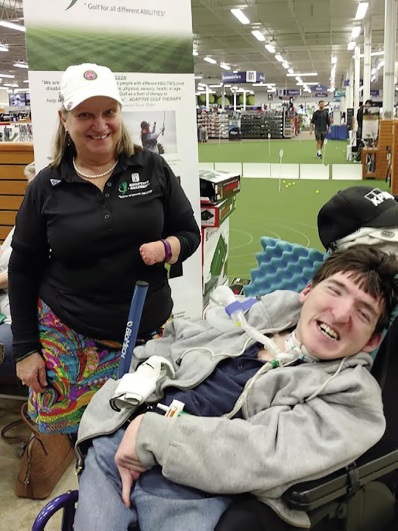While some technologies and programs do exist, most are inaccessible to those who need it the most, or they serve as one-sizefits-all solutions, attempting to address a community where no two individuals are alike.
Through Adaptive Golfers, the mission is to re-imagine golf to allow any and everyone to discover the incredible benefits the game has to offer. Today, Adaptive Golfers hosts accessible golf clinics across the country, as well as training for golf instructors and course operators interested in better equipping their facilities to support golfers of all different abilities. People with disabilities have an even greater chance of reaping the rewards golf brings. The reason: People with disabilities spend far less time outside the home socializing. They tend to feel more isolated and participate in fewer communal activities. Besides the apparent physical benefit of Adaptive Golf, the impact on their self-identity is profound. Golf has proven to be an incredibly effective medium, and when some level of mastery is achieved, its powerful medicine. Adaptive Golfers helps to create a sense of camaraderie and inclusiveness, providing encouragement and support to help re-build an individual’s sense of dignity and self-esteem. Wellbeing is critical for humans. For those with adaptive needs, we feel “well” when we gain a sense of control over the consequences of our disability.
Through the benevolence and the generosity of others and funding from the Make Golf Your Thing Grassroots Grant Program, Adaptive Golfers can offer programs and clinics to children with physical or cognitive challenges, young girls and women with disabilities, wounded veterans, first responders, and individuals who have suffered strokes, heart attacks, TBI, loss of limbs, etc. “Neither the ball nor the hole care if you roll it with your nose.” Therefore, instead of disabilities, I prefer to say “different abilities.”
Through the educational programs, Adaptive Golfers provides education to golf courses and facilities, instructors, parks and recreation, schools, and allied health and rehabilitative industries to bridge the knowledge gap on golf as a therapeutic activity.
There are experienced instructors, manufacturers, and organizations working day in and day out to help adaptive golfers discover the wonders and therapeutic values of the game.
I believe in the words attributed to John F. Kennedy: “One person can make a difference, and everyone should try,” and I live my life accordingly. I recognized that what was lacking for individuals like myself was a voice. So, I decided to use my voice to advocate globally for adaptive golf. I am passionate about bringing attention to the success
stories of Adaptive Golfers and share my own story in the hopes of inspiring others who may question their own abilities. This is all heart. My purpose isn't for my handicap or my score, or for me to have bragging rights and trophies. My purpose is that 13-year-old girl who needs to see somebody like her out there doing something that she would like to do and think, "Wow, if she can, maybe I can, too." I am trying to leave some sort of legacy when I'm not here any longer, that maybe I've changed somebody's life.
FS: Share an example of one of your many touching stories.
GR: I had a booth at an expo. A man who had a stroke three years ago could barely move. He used to play golf. He just happened to be passing by. When he saw the word "golf" at my table, he moved his head slightly and his wife asked if he wanted to go over and meet me. I started talking to him. I said that the best thing is for me to get connected with his rehabilitation team and have them use golf motions as a therapeutic activity. Just small motions: moving one arm, throwing a ball from the bed to the garbage can. This big strong (in persona) man was bawling saying, "Thank you thank you." I hugged him and he would not let go of me, saying in my ear, "Thank you, thank you." Giving him a little glimmer of hope that he can get back to golf, in some form or another, really helped.

SWEET SPOT: Gianna speaking with a prospective golfer; "Every experience like this gives me back a little piece of my heart that was taken from me growing up."
And I can tell you, when you’re standing, hugging and crying, the impact is heartwarming. I am confident in saying that we change so many people’s lives. One little chance meeting and giving him a little glimmer of hope that he can get back to golf, in some form or another, is what this is all about. Every experience like this gives me back a little piece of my heart that was taken from me growing up.
FS: This is really wonderful and I'm so glad that we're doing this article. You're doing such wonderful things and making a big difference. You're truly an inspiration. I'm thrilled the magazine is able to give you more exposure, so even more people can be inspired by you.
GR: I love EP Magazine. It makes a big impact. You are giving the audience – parents, caretakers, individuals with disabilities – a tool.
FS: What advice would you give others with a disability?
GR: Don’t say “Can I?” Say “How can I?” “How can I?” gives you that opportunity for trial and error. If you say, “Can I?” You might try it once, then say, “See, I told you I can’t.” “How” makes you want to keep trying until you get to that outcome of what you want, whatever it is, whether it’s golf or anything else. •
For more information about Gianna Rojas and Adaptive Golfers, please visit www.adaptivegolfers.org